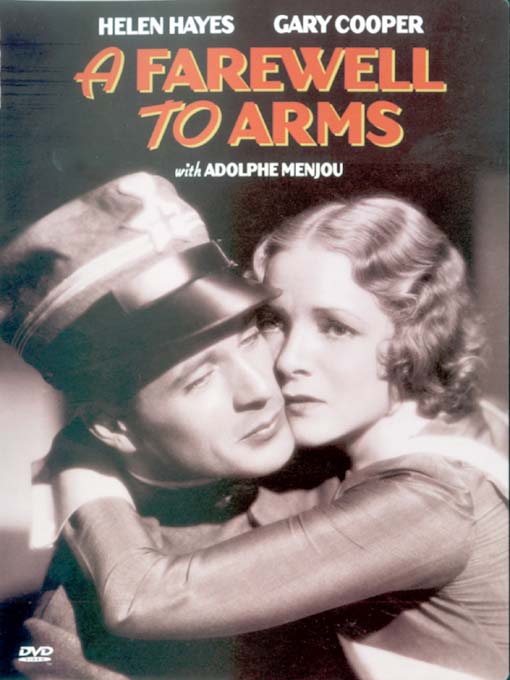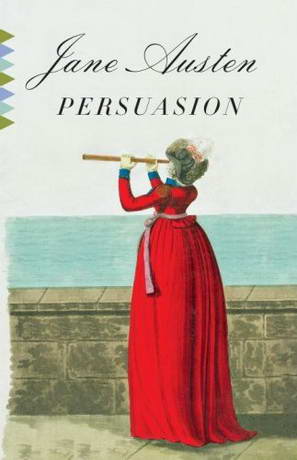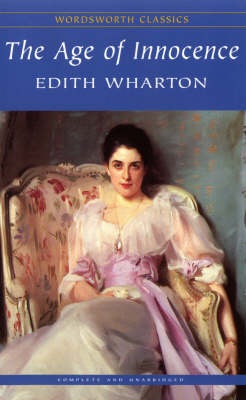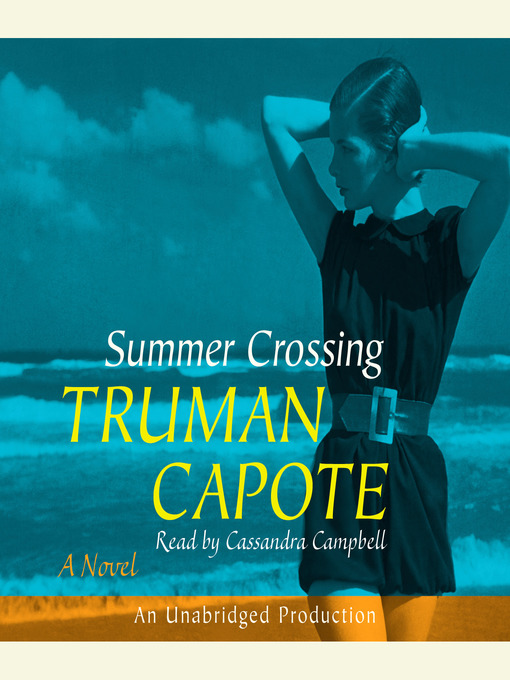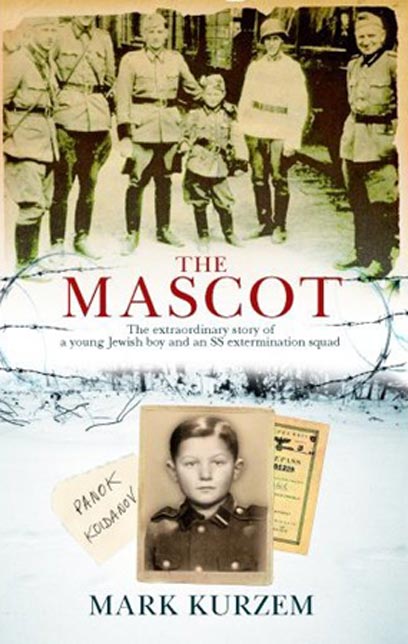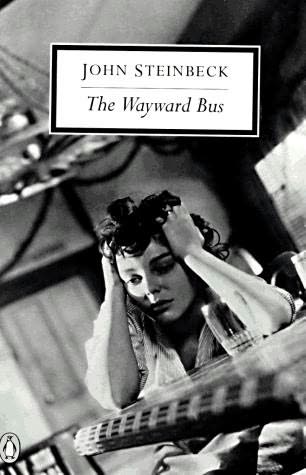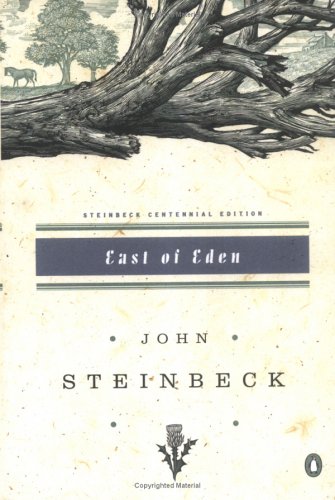12/18/09
11/20/09
Persuasion (1817)
While reading, I found Lady Russell’s role in Jane Austen’s Persuasion to be ambiguous and sometimes confusing. When she was first introduced I thought that she would act as a good substitute mother for Anne but as the book continued I found that her motives were not as clear as I originally thought and that, though Anne respects and loves Lady Russell, the only way she can be happy is by ignoring her mentors advice. Susan Peck MacDonald attempts to fit Lady Russell into her theory that “there are three kinds of mothers in Austen’s novels- dead mothers, absent mothers, and flawed (perhaps even obnoxious) mothers” (61). Since Anne already has a dead mother, she suggests that Lady Russell is a flawed mother. I agree with MacDonald and by looking at Lady Russell from this perspective, Lady Russell’s character makes a little more sense.
Lady Russell has no children of her own and is “of a steady age and character, and well provided for, [had] no thought of a second marriage” (Austen 4) and so she seems like she would be an appropriate mother-figure for Anne. Before Lady Elliot’s death, Lady Russell was her best friend and advisor; the narrator also tells us that after the death of Lady Elliot, Anne is left with no ally within her family and Lady Russell tries to take her mother’s place in instructing her and giving her advice. The family respects her and to Lady Russell, Anne is a “highly valued god-daughter, favorite and friend” (Austen 5). However, seven years before the novel takes place, Lady Russell advised Anne to break her engagement to Wentworth because he was in the Navy and did not have a fortune yet. Lady Russell is known by many people to be “able to persuade a person of anything” (Austen 79), but it seems that her advice to Anne was mistaken because within a few years Wentworth made rank and money.Her mistake doesn’t necessarily make her a bad mother-figure, but her ability to persuade Anne of anything become detrimental to Anne’s well-being.
The only marriage that Lady Russell does support is the match between Anne Elliot and her cousin William Elliot. She attempts to persuade Anne into believing this would be the best match for Anne because “the idea of becoming what [Anne’s] mother had been; of having the precious name ‘Lady Elliot’ first revived in herself; of being restored to Kellynch, calling it [Anne’s] home again, her home forever was a charm which [Anne] could not immediately forget” (Austen 123). Here, Lady Russell’s motives, for the first time, are questionable. As MacDonald says Anne “Lady Russell’s inadequacy as a mother substitute is just this- that she would have Anne slavishly copy the past” (Austen 67). There is also something creepy about Lady Russell attempting to mold Anne after her birth-mother. Lady Russell is being selfish and instead of advising Anne to do what is best for her, I felt that Lady Russell was trying to groom Anne to become not only the next Lady Elliot but also her best friend. However, Anne’s “judgment…was against Elliot” (Austen 123), and when Mrs. Smith reveals the truth about Elliot, Anne’s first instinct is that she must confer with Lady Russell about this new development.
At the end of the novel when she decides to marry Captain Wentworth despite the advice she had received from her mentor years earlier, but she still feels that “only one among them, whose opposition of feeling could excite any serious anxiety, was Lady Russell. Anne knew that Lady Russell must be suffering some pain in understanding and relinquishing Mr. Elliot, and be making some struggles to become truly acquainted with, and do justice to Captain Wentworth” (Austen 195). Anne still respects the opinion of her godmother even though “there was nothing less for Lady Russell to do than admit that she had been pretty completely wrong” (Austen 195). MacDonald sums up and explains this phenomenon by noting that “Lady Russell has tried to take the place of Anne’s mother in the courtship process, and the resultant doubling of the motherly role allows the mother herself- and motherhood- not to be denigrated while at the same time Anne must reject her substitute mother’s view of who Anne should marry” (65).
At first I thought it would be impossible to fit Lady Russell into MacDonald’s dead, absent, or flawed mother categories, but MacDonald further says that “Anne is like the other Austen heroines who become stronger from having to struggle either without their mother’s help or in spite of obstacles caused by a mother or her substitute” (65). After reading MacDonald’s article I agree that Lady Russell is trying to fill the role of mother for Anne even if she is not very successful. She gives bad advice to Anne twice in the story and waywardly pushes Anne towards emulating her birth-mother. Though I can forgive Lady Russell for misreading Wentworth and Elliot, I can not forgive her for selfishly trying to turn Anne into a second Lady Elliot. Lady Russell’s bad advice makes her a weak mother and even a flawed mother in MacDonald’s words.
[Note: The MacDonald article I am referring to is called “Jane Austen and the Tradition of the Absent Mother” and can be found in The Lost Tradition: Mothers and Daughters in Literature (1980).]
Lady Russell has no children of her own and is “of a steady age and character, and well provided for, [had] no thought of a second marriage” (Austen 4) and so she seems like she would be an appropriate mother-figure for Anne. Before Lady Elliot’s death, Lady Russell was her best friend and advisor; the narrator also tells us that after the death of Lady Elliot, Anne is left with no ally within her family and Lady Russell tries to take her mother’s place in instructing her and giving her advice. The family respects her and to Lady Russell, Anne is a “highly valued god-daughter, favorite and friend” (Austen 5). However, seven years before the novel takes place, Lady Russell advised Anne to break her engagement to Wentworth because he was in the Navy and did not have a fortune yet. Lady Russell is known by many people to be “able to persuade a person of anything” (Austen 79), but it seems that her advice to Anne was mistaken because within a few years Wentworth made rank and money.Her mistake doesn’t necessarily make her a bad mother-figure, but her ability to persuade Anne of anything become detrimental to Anne’s well-being.
The only marriage that Lady Russell does support is the match between Anne Elliot and her cousin William Elliot. She attempts to persuade Anne into believing this would be the best match for Anne because “the idea of becoming what [Anne’s] mother had been; of having the precious name ‘Lady Elliot’ first revived in herself; of being restored to Kellynch, calling it [Anne’s] home again, her home forever was a charm which [Anne] could not immediately forget” (Austen 123). Here, Lady Russell’s motives, for the first time, are questionable. As MacDonald says Anne “Lady Russell’s inadequacy as a mother substitute is just this- that she would have Anne slavishly copy the past” (Austen 67). There is also something creepy about Lady Russell attempting to mold Anne after her birth-mother. Lady Russell is being selfish and instead of advising Anne to do what is best for her, I felt that Lady Russell was trying to groom Anne to become not only the next Lady Elliot but also her best friend. However, Anne’s “judgment…was against Elliot” (Austen 123), and when Mrs. Smith reveals the truth about Elliot, Anne’s first instinct is that she must confer with Lady Russell about this new development.
At the end of the novel when she decides to marry Captain Wentworth despite the advice she had received from her mentor years earlier, but she still feels that “only one among them, whose opposition of feeling could excite any serious anxiety, was Lady Russell. Anne knew that Lady Russell must be suffering some pain in understanding and relinquishing Mr. Elliot, and be making some struggles to become truly acquainted with, and do justice to Captain Wentworth” (Austen 195). Anne still respects the opinion of her godmother even though “there was nothing less for Lady Russell to do than admit that she had been pretty completely wrong” (Austen 195). MacDonald sums up and explains this phenomenon by noting that “Lady Russell has tried to take the place of Anne’s mother in the courtship process, and the resultant doubling of the motherly role allows the mother herself- and motherhood- not to be denigrated while at the same time Anne must reject her substitute mother’s view of who Anne should marry” (65).
At first I thought it would be impossible to fit Lady Russell into MacDonald’s dead, absent, or flawed mother categories, but MacDonald further says that “Anne is like the other Austen heroines who become stronger from having to struggle either without their mother’s help or in spite of obstacles caused by a mother or her substitute” (65). After reading MacDonald’s article I agree that Lady Russell is trying to fill the role of mother for Anne even if she is not very successful. She gives bad advice to Anne twice in the story and waywardly pushes Anne towards emulating her birth-mother. Though I can forgive Lady Russell for misreading Wentworth and Elliot, I can not forgive her for selfishly trying to turn Anne into a second Lady Elliot. Lady Russell’s bad advice makes her a weak mother and even a flawed mother in MacDonald’s words.
[Note: The MacDonald article I am referring to is called “Jane Austen and the Tradition of the Absent Mother” and can be found in The Lost Tradition: Mothers and Daughters in Literature (1980).]
11/10/09
Mansfield Park (1814)
When Fanny first arrives to Mansfield Park, the family (especially her female cousins) is quick to point out her shortcomings. Julia and Maria “could not but hold her cheap on finding that she had but two sashes and had never learnt French” (15) and even their mother Lady Bertram assumes that she is “stupid at learning” (20). Only Edmond “knew her to be clever, to have a quick apprehension as well as good sense, and a fondness for reading” (22). Though the three female cousins shared a governess, Fanny’s education would have been lacking without the help of Edmond who “recommended the books… encouraged her tastes and corrected her judgment” (22).
During her stay in Portsmouth, Fanny finds that there are no books in her family’s house and Susan, unlike herself, “had no cousin Edmond to direct her thoughts or fix her principals” (369). As Susan and Fanny begin spending more time together, at first they just talk but after a while Fanny’s desire for books become so “potent and simulative” that she became “a renter, a chuser of books” (370). While Fanny is in Portsmouth she also longs for Edmond, but doesn’t even receive a letter.
Though Fanny claims that she has nothing in common with Henry Crawford, they do share an interest in books. One of Fanny’s duties is reading aloud to Lady Bertram and when Henry and Edmond interrupt her reading one evening, Henry takes over reading King Henry the Eighth. Everyone is so impressed by his reading and Henry humbly insists that he hasn’t picked up the play since he was 15, but “it will be a favorite I believe from this hour” (312). He even impressed Fanny until “the book was closed, and the charm was broken” (312). He further succeeds in impressing her by discussing the merits of Shakespeare and the ability to read aloud. The discussion turns back to theatre when Lady Bertram suggests that Henry should build a theatre at his house in Norfolk. Henry replies “with quickness, ‘No, no, that will never be. Your Ladyship is quite mistaken. No theatre at Everingham! Oh! No.’ – And he looked at Fanny with an expressive smile, which evidently meant, ‘that lady will never allow a theatre at Everingham’” (313). In this scene, and also in Henry’s subsequent trip to Portsmouth to visit Fanny, Austen shows that Henry is making every effort to show Fanny that they do have things in common.
Fanny admits that near the end of the novel that Henry’s behavior was improving and I think that if Henry had not eloped with Maria, Fanny would have eventually married him. Though Fanny had been in love with Edmond all along, without scandal hitting the Bertram family, Fanny would not have been able to marry Edmond. In the very first chapter of the novel, Sir Thomas vocalizes his fear that one of his sons might fall in love with Fanny. He is worried for two reasons though: the first being “of cousins in love” (7), and the second being that if one of his sons did marry Fanny, they would sacrifice a more lucrative marriage match. Between Tom falling ill and Maria and Julie eloping, Sir Thomas probably gave up on Edmond marrying well. Though Fanny and Edmond are happy at the end of the novel, I have a hard time believing that their marriage is the best outcome for everyone in the novel.
11/4/09
Song of Solomon (1977)
 “Pretty woman, [Guitar] thought. Pretty little black-skinned woman. Who wanted to kill for love, die for love. The pride. The conceit of those doormat women amazed him” (Morrison 306).
“Pretty woman, [Guitar] thought. Pretty little black-skinned woman. Who wanted to kill for love, die for love. The pride. The conceit of those doormat women amazed him” (Morrison 306).Morrison mentions in the forward of the book that “the challenge of Song of Solomon was to manage that was for me a radical shift in imagination from a female locus to a male one. To de-domesticate the landscape that had so far been the site of my work” (Morrison xii), but do the women in the novel suffer from this change of focus? Morrison has created a diverse and complicated set of female characters for this novel that does not rely on stereotypical characterizations of women.
Within the Dead Family I see 4 main types of women in the novel. We have the women who are domesticated and held down by men in their family (Ruth, Corinthians, and Magdalena), the woman who is strong and empowered (Pilate), the woman who has nothing going for her but luck (Reba), and the woman who lives on the love of others (Hagar).
The sisters Corinthian and Lena, perhaps since they are wealthy African Americans, are educated and intelligent. Though these women are oppressed, Morrison gives them the ability to recognize it. Lena confronts Milkman in the hallway one night after he “defended” their mother by hitting Macon. She says that in that action he was not protecting her, he was “taking over, letting [them] know [he] had the right to tell her... what to do” (Morrison 216). Even Ruth let’s Milkman know that she is being oppressed and censored by her husband. She tells her son “I am not a strange woman. I am a small woman” (Morrison 124) as she tries to explain her side of the story and her attachment to her father. In a truly male dominated novel, the women would not be given a chance to defend and explain themselves to this extent. However, these three women are weak women; they can not stand up to Macon and will never leave his house.
The reason I started with a quote from Guitar about Hagar is because I think her matriarchal family is very interesting. Both Pilate and her daughter Reba each refused to marry the men who fathered their children. Pilate has come to terms with the fact that she can’t stay with a man because she has no naval, but why doesn’t Reba marry? In the novel, the survival of this family of women depends on two things: the sale of wine and luck. During their first visit, the women tell Guitar and Milkman that “Reba wins things. She ain’t never lost nothing” (Morrison 45), and the exploitation of this luck has been keeping the family fed. But Reba’s “luck” also pays for Hagar’s manic makeover when Reba sells the diamond ring she won so that Hagar can go shopping.
What is Morrison is trying to say about feminism through Hagar’s actions? Guitar calls her a “doormat woman” (Morrison 306), but I don’t think she started out that way. She admits to Milkman that she is waiting for “Prince Charming” (Morrison 97) but then makes love to her 17 year old cousin. Years down the road by the time Milkman is 31, Hagar isn’t as in control of their relationship as she was in the beginning (Morrison 98). Earlier, Hagar said “every woman’s not as strong as she is” (Morrison 96) and that she has no weaknesses. But now her weakness is that she is afraid of being alone and this weakness eventually kills her. Guitar suggests though that the fault is not on Milkman’s shoulders because women like Hagar “were always women who had been spoiled children” (Morrison 306). Guitar tries to persuade her not to believe that “belong” is a dangerous word (Morrison 306). But Hagar ignores him and instead tries to give herself a physical makeover that she thinks will make Milkman love her. This makeover would require her to give up some of the things that make her a strong African American women, and fittingly she dies before she can complete the transformation.
For a novel that supposedly is focused on a man’s journey to self discovery, Morrison still does not reject or forget the women. Though this novel is supposed to illustrate “a radical shift in imagination from a female locus to a male one” (Morrison xii), the author does not make her women suffer the punishment of being superficial or flat characters. Morrison also notes in her foreword that “Milkman summons a conundrum: that without ever leaving the ground [women] could fly” (Morrison xiv). I thought at first that Morrison was suggesting that since the women in the novel are strong and complex, they do not need to travel anywhere (in literal sense) to find self enlightenment. But Milkman’s mother and sisters are never empowered and Hagar is dead by the end of the novel because, instead of bettering herself, she tries to become the woman that Milkman would want. So the conundrum I face is what is Morrison trying to say about women in this novel?
Roman Fever (1934)
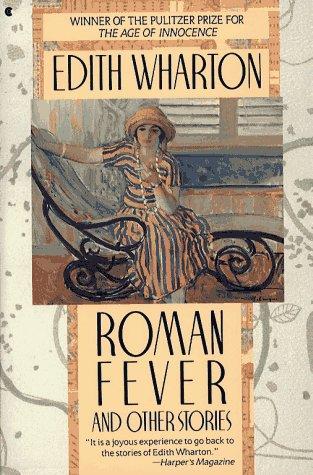 Edith Wharton’s “Roman Fever” very simply centers on a single conversation between two middle-aged women, Grace Ansley and Alida Slade. Early in the story, Alida wonders aloud about what Rome has meant to tourists who have come there over the years: “To our grandmother’s Roman fever; to our mother’s sentimental dangers… to our daughters, no more dangers than the middle of Main Street” (15). She defines Rome for three generations of women, except her own. The conversation between the two women reveals a lot about their past, but the setting and how they interact with it reveals more about the two women.
Edith Wharton’s “Roman Fever” very simply centers on a single conversation between two middle-aged women, Grace Ansley and Alida Slade. Early in the story, Alida wonders aloud about what Rome has meant to tourists who have come there over the years: “To our grandmother’s Roman fever; to our mother’s sentimental dangers… to our daughters, no more dangers than the middle of Main Street” (15). She defines Rome for three generations of women, except her own. The conversation between the two women reveals a lot about their past, but the setting and how they interact with it reveals more about the two women.From the beginning, Wharton presents a contrast between the two friends in appearance and personality. Alida is called the “dark lady” (12), while Grace is the “smaller, paler one” (9). However, years after marrying and living“opposite each other-actually as well as figuratively- for years” (12), the two women find themselves again in Rome in similar situations. Both women have been widowed and are at the end of their lives as desirable lovers. The time of day when this conversation takes place- late afternoon and dusk- also corresponds with the age of the women. When their waiter suggests that the two women can enjoy the moonlight on the terrace together, Alida believes the reference to be “out-of-place and unwelcome” (11) because moonlight is sentimental and for lovers. But it is acceptable that their daughters are enjoying a moonlit airplane ride with their young men.
Finding themselves faced with the realization that the next generation of young, sentimental girls has taken possession of the moonlight, the women also find themselves looking down at the ruins of the Palatine and the Forum that act as another reminder of their own youth. Both women at first seem satisfied sitting quietly “with the same expression of vague but benevolent approval” (9)on their faces while looking at the ruins before them. But Alida soon finds “her eyes ranging from the ruins… [to] the outlying immensity of the Colosseum” (16) .The “immensity” that Alida sees in the Colosseum represents not just it’s size, but also the size of the deception she used to manipulate and punish her friend years before for falling in love with Delphin, Alida’sfiancée. However, where Alida sees “immensity,” Grace sees the “wreckage of passion and splendor at her feet” (17), indicating that the two women have very different perspectives of Rome and what it means to them. While looking at the ruins of the Roman Empire they each must realize that it is like looking at the ruins of their own lives.
Like the Romans before them, in their youth Alida and Grace used the Coliseum as a battleground for Delphin. For years, Alida had thought that she came out of this battle victorious, but by the end of their conversation she realizes that her attacks had backfired. As a result, Grace gave birth to the “dynamic” (17) daughter that Alida had always wanted. For Grace, the landscape in front of her represents passion, and though she didn’t get to marry Delphin, she did get to take a piece of him away from Alida.This accounts for Grace’s self-satisfied perspective of the ruins that lay “at her feet” (17) as if she owns them.
10/20/09
The Reef (1924)
 In the final chapter of Edith Wharton’s The Reef, Anna Leath decides to visit Sophy Viner after finally deciding not to marry Darrow. She says that Sophy will be her “anodyne” (360); the medicine that would cure her troubles and “give her back her lost serenity” (360). However, after meeting Sophy’s sister, Anna gives up her search, not just because Sophy has run off to India, but also because of the strange encounter. A dingy hotel room sets the scene for this bizarre final chapter, which is a stark contrast to the setting of the previous chapters in Givré.
In the final chapter of Edith Wharton’s The Reef, Anna Leath decides to visit Sophy Viner after finally deciding not to marry Darrow. She says that Sophy will be her “anodyne” (360); the medicine that would cure her troubles and “give her back her lost serenity” (360). However, after meeting Sophy’s sister, Anna gives up her search, not just because Sophy has run off to India, but also because of the strange encounter. A dingy hotel room sets the scene for this bizarre final chapter, which is a stark contrast to the setting of the previous chapters in Givré.When Anna decides she must talk with Sophy, I don’t understand her intentions. She could have wanted to know the specifics of her relationship with Darro
w since Darrow himself would not tell her, or she could have decided to tell Sophy she was free to
marry Owen. In either case, the hunt for Sophy is much more complicated than Anna expected. Sophy is no longer with the Farlows because she has gone to visit with her sister, Laura McTarvie-Birch. Anna is so sure that Sophy is the answer to all of her problems that she follows this lead to a hotel near the Place de l’Etoile. Upon her arrival, Anna is thrown into a very strange situation with a very strange set of people. First there is this “mute spectator” (363) who takes a break from staring at his hat to stare at Anna in a disconcertingly similar and rude manner. Anna at first assumes that the second man in the hotel room must be Laura’s husband. He is more polite than his friend, but just lounges around chain-smoking. By the end of the chapter however, Laura reveals to us that the chain-smoker is actually Jimmy Brance (367). This means nothing to Anna, but it does mean something to the reader; Jimmy Brance knew Sophy when she worked for Mrs. Murrett a year or two before.
The bedroom scene is very surreal, especially compared to the rest of the novel. When Anna finally has the chance to talk with Laura, she must enter her “dim untidy scented room” (364) where Laura is laying in some state of undress receiving a massage. The bedroom is in a state of disarray, and everything is pink and covered in powder puffs. Laura is described very vaguely at first as “a lady with a great deal of fair hair…. [and] a thickly-ringed hand” (364). Anna is startled to realize that she is looking at “an odd chromo-like resemblance of Sophy.… larger, blonder, heavier featured” (365), but Anna also recognizes some of the same charm and grace that she admired in Sophy. This meeting serves to not only show a resemblance between the two sisters, but to also show what Sophy could become.
After Laura reveals that Sophy has returned to her job with Mrs. Murrett, Sophy and Mr. Darrow’s motives become questionable. It seems to be too much of a coincidence that the novel begins and ends with Sophy being employed by Mrs. Murrett. From the description of Mrs. Murrett in the beginning of the novel, she seems unsophisticated and maybe even unsavory especially compared to Anna Leath. Now Laura, Sophy’s only living family, is portrayed as being just as unsophisticated. The fact that both Mr. Darrow and Sophy have a history with people like Mrs. Murrett and Laura forces me question their backgrounds and characters as well. I think that earlier in the novel, Anna was able to forgive Sophy’s past and bless her marriage to Owen, but now that Anna knows that Sophy has returned to Mrs. Murrett, I think she questions Sophy’s intentions too. The setting of this final chapter, since it is so different from the rest of the book, serves to reinforce this idea. I am still left with a lot of questions at the end of the novel, mainly fueled by the last chapter, and it would be an interesting question to research further.
10/6/09
Sense and Sensibility (1811)
 Before I began reading this novel, sense and sensibility were two words that were almost interchangeable. I knew that there was some subtlety between the two definitions, but seeing sense and sensibility in action and embodied by Elinor and Marianne respectively made the definitions more clear to me. Once I saw this pair however, I began to see pairs all over the novel of couples or sisters playing the part of either sense or sensibility.
Before I began reading this novel, sense and sensibility were two words that were almost interchangeable. I knew that there was some subtlety between the two definitions, but seeing sense and sensibility in action and embodied by Elinor and Marianne respectively made the definitions more clear to me. Once I saw this pair however, I began to see pairs all over the novel of couples or sisters playing the part of either sense or sensibility.In the first chapter, the personalities of the two sisters are depicted as complementary opposites. Elinor is described as “the qualified… counselor of her mother…. her disposition was affectionate, and her feelings were strong: but she knew how to govern them” (Austen 3). Marianne on the other hand is “sensible and clever, but eager in everything; her sorrows her joys, could have no moderation” (Austen 3). Elinor embodies the logical and practical side of sense while her sister illustrates the sensitivity to emotion that is defined by sensibility.
The most important pair that mirrors the sense and sensibility motif is the Steele sisters. “Lucy and Anne Steele together with Lady Middleton and Mrs. Palmer function as parodic reflections of Elinor and Marianne. These reflections are both dim and distorted… [but] not if we focus on Elinor’s capacity for self-control and Marianne’s contrasting inability to control her emotions” (Brown 61). The personality traits I highlighted earlier are heightened by the similarities between the two sets of sisters. Initially, The Dashwood sisters are wary of going to meet with the Steeles because they did not know anything about their character since Sir John is given to exaggeration. When they do meet there are obvious resemblances between the two sets of sisters. Elinor and Lucy both are forced to cover for their sister’s forwardness in conversation or in social situations; Marianne and Anne “both have a tendency to speak with thoughtless exaggeration, to the chagrin of their sisters” (Brown 64). Elinor is given the “task of telling lies when politeness required” (Austen 81) and Lucy similarly is forced to apologize for her sister being impudent or “too familiar” when talking about their beaux and Norland (Austen 82).
Both Elinor and Lucy seem to be more practical and smarter than their sisters in the respect that they are more guarded with their words and actions rather than acting emotionally or impulsively. So far, the similarities between Marianne and Anne are sparser. However, from their conversations in chapter 21, it is obvious that Marianne and Anne are quicker to emotional type outburst as the definition of sensibility suggests. Brown also points to Elinor and Lucy having the same hair color as another mark signifying the similarity between the two girls which is how Elinor and Marianne mistakenly believed that Edward was wearing Elinor’s lock of hair (62).
The most humorous pair that portrays sense and sensibility in the novel is Mr. and Mrs. Palmer because they are such an exaggerated depiction of the title. Mr. Palmer to a fault represents sense. Like Elinor, he appears more reserved in public but also cynical. Mrs. Palmer, representing sensibility is a gushing, “very silly woman” (Austen 75) who constantly laughs and says “Mr. Palmer is so droll” (Austen 74, 76). This husband and wife serve as a warning to Elinor and Marianne. The traits of sense and sensibility when taken to an extreme can be dangerous.
The relationships of the pairs that depicted throughout the novel so far I’m sure will play a role in the second half of the book. I will be interested to see if Jane Austen begins to show us that whether embodying either sense or sensibility is more fruitful. I would also want to finish the reading before I begin to decide if and how Elinor and Marianne are similar to the sisters from Pride and Prejudice.
[Note: the Brown book I am referring to is Devoted Sisters: Representations of the Sister Relationship in Nineteenth-Century British and American Literature.]
9/20/09
House of Mirth (1905)
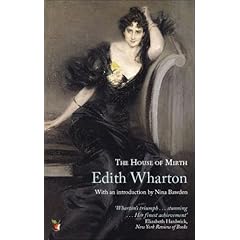 Edith Wharton’s House of Mirth is a novel about society in the twentieth century, focusing on the role of upper-class women. Though the modern reader may not be sympathetic to Lily Bart’s plight in life, Lily is a victim and prisoner of her era as well as money and social expectations. In this novel, Wharton illustrates a variety of women; the unmarried philanthropist Gerty Farish, the adulteress Bertha Dorset, the widow Julia Peniston, the divorcée Carry Fisher. But none of these are women that Lily Bart can respect as a role model. With so few options, Lily’s course in life is already dictated for her; “she was so evidently the victim of the civilization which had produced her, that the links of her bracelets seemed like manacles chaining her to fate” (Wharton 7).
Edith Wharton’s House of Mirth is a novel about society in the twentieth century, focusing on the role of upper-class women. Though the modern reader may not be sympathetic to Lily Bart’s plight in life, Lily is a victim and prisoner of her era as well as money and social expectations. In this novel, Wharton illustrates a variety of women; the unmarried philanthropist Gerty Farish, the adulteress Bertha Dorset, the widow Julia Peniston, the divorcée Carry Fisher. But none of these are women that Lily Bart can respect as a role model. With so few options, Lily’s course in life is already dictated for her; “she was so evidently the victim of the civilization which had produced her, that the links of her bracelets seemed like manacles chaining her to fate” (Wharton 7).From an early age, Lily has been groomed, probably like her mother before her, to marry a wealthy man. Before her death, Mrs. Bart watched over Lily’s beauty and “studied it with a kind of passion, as though it was some weapon she had slowly fashioned for her vengeance” (Wharton 34). Now Lily is 29 years old and even though she has had numerous chances at marriage she has somehow missed her opportunity. While talking to her long-time friend Lawrence Seldon she admits, “’I’ve been about too long – people are getting tired of me; they are beginning to say I ought to marry’….[ Selden] returned amicably, ‘isn’t marriage your vocation? Isn’t it what you were brought up for?’” (Wharton 9). Though it is her “vocation,” marriage is not something that she necessarily wants. She is forced to chase potential husbands by “organizing methods of attack” (Wharton 17) behind a a gauze of beauty. Though Lily is a jeune fille à marier she does not have a mother or chaperone to guide her.
In “Book 1,” Lily spots and chases the wealthy bachelor Percy Gryce. Lily is smart enough to know that if she wants to keep up her present way of living, she needs to marry rich. Her only other option is to stay single, but the Gerty Farish is the only example of a woman who bucks tradition in this way, and Lily thinks that she is unstylish and “her cook does the washing and the food tastes of soap” (Wharton 7). Her only alternative is to try to secure a husband for herself. She knows that her marriage will not be for love, but it instead will be a marriage of convenience to insure her social standing and income. To Lily, marrying Gryce “was a hateful fate- but how escape from it?” (Wharton 25). Sadly when she misses out on this match, she becomes indebted to another man when she tries to secure financial stability in a different way.
When Lily asks Gus Trenor for financial help, she unknowingly forms a very dangerous relationship with a married man. Lily accidently indebts herself to Trenor after accepting money from him and creates for herself another prison. She is forced to humor Trenor and she puts herself in some very questionable situations that could hurt her reputation. When Trenor manipulates and lies to her in order to get her alone in his house, it very suddenly and horrifyingly becomes obvious how much control he has. When Lily finally gets away from Trenor, who is literally imprisoning her in his house, “she [feels] a mad throb of liberation, intoxicating as the prisoner’s first draught of free air” (Wharton 147).
The novel House of Mirth is full of vocabulary and situations that keep reinforcing a theme of imprisonment. This imprisonment seems to extend to all of the women in the novel in one form or another, but it especially dictates the life of Lily Bart. Lily is imprisoned by the expectations of her family, friends, and society, but almost more importantly by money.
Pride and Prejudice (1813)
 This was officially my first Austen book. Not exactly my first exposure to her, her novels are so mainstream and made into numerous movies (on both sides of the pond) but I had never read one of her books. I admitted this to the class in my grad class and actually I was not a minority. A lot of people had skipped her or just watched the movies.
This was officially my first Austen book. Not exactly my first exposure to her, her novels are so mainstream and made into numerous movies (on both sides of the pond) but I had never read one of her books. I admitted this to the class in my grad class and actually I was not a minority. A lot of people had skipped her or just watched the movies.So, while I was reading this book I was struggling not to imagine the movie that I saw a few years ago playing out in my brain (i believe I saw the 2006 version with Keira Knightley). All together, once I got past the first 50 pages I become more interested and invested in the story line and by the time I finished it I genuinely enjoyed the novel so much that I kicked myself for not having signed up to write one of my position papers on it.
The class has a focus on Edith Wharton/Jane Austen so my next dozen books are decided for me- don't know when I'll return to the luxury of selecting my own books...
The Tempest (1610-1611)

TRINCULO: … [He sees CALIBAN.] “What have we here? A man or a fish? Dead or alive? A fish: he smells like a fish; a very ancient and fishlike smell; a kind of not-of-the-newest poor-John. A strange fish. Were I in England now (as once I was) and had but this fish painted, nota holiday fool there but would give a piece of silver” (Shakespeare 37)
Caliban was the only living human (or at least half-human) on the island when Prospero and Miranda first land there, and the only man besides her father that Miranda ever meets before she marries Ferdinand. Caliban is described throughout the play as “a freckled whelp, hag-born… not honored with a human shape,” “a strange fish” (37), “a monster,” “an islander, that hath lately suffered by a thunderbolt,” “some monster of the isle with four legs” (38), “man-monster” (46), and “moon-calf.” He is also characterized as an animal, with references to being kept in a sty like a pig (18), and being referred to as a slave throughout.
The reason that the other characters looks down on Caliban doesn’t just lie in his appearance but also in his family. Prospero tells his story: “the foul witch Sycorax…. The blue-eyed hag was hither brought with child and here left by the sailors” (16). Sycorax came from Algiers and was obviously accused of witchcraft, but instead of being killed, the people just sent her away to this uninhabited island since she was pregnant. The editors note that the reference to Sycorax having blue eyes could just be another remark concerning her pregnancy or that it could mean that she was “an unusual figure in Algiers, where dark eyes would be the norm.”
The first person to enslave Caliban in this play is Prospero. Prospero, at least according to the story he tells Miranda, found him, took him in, and taught him English. In turn, Caliban “then loved [him] and showed [him] all the qualities o’ th’ isle, the fresh springs, brine-pits, barren places and fertile” (18). Prospero, as explorers or colonists often do, met Caliban, saw all of his barbarian ways, and tried to teach him otherwise. This lasted only until Caliban tried to rape Miranda. Propero’s attempts to teach Caliban had almost completely failed because Caliban just wanted to “people else this isle with Calibans” (19). Though Caliban did learn to speak from Prospero, he still reverted to a more animalistic way of thinking.
Though the characters treat him as a freak, oddly enough the first thought that enters everyone’s mind after they meet Caliban is how can I use him to my own ends. Both Trinculo and Stephano think about selling him some how; Stephano says “If I can recover him, and keep him tame, and get to Naples with him, he’s a present for any emperor” (38). But when Stephano gets Caliban drunk, he realizes (as Prospero did before) that Caliban can be useful in other ways. Caliban calls Stephano his god and offers to show how to live on the island, how to overthrow Prospero, and how to take Miranda. Stephano and Trinculo take advantage of Caliban saying “O brave monster, lead the way!” (41) and Caliban celebrates trading one tyrant for another.
Even if Caliban’s intelligence is inferior to his master’s, Caliban tells the two shipwrecked men that they must “remember first to posses [Prospero’s] books; for without them he’s but a sot” (48). Caliban has served Prospero long enough to know his weakness; we don’t really know if they sorcerer’s strength really lies in his books, but Caliban seems to think this. When the three men finally get to Prospero’s cave, Trinculo and Stephano foolishly begin going through Prospero’s things and stealing clothing instead of looking for the books.
It’s unclear if Prospero know that his slave Caliban had betrayed him and pledged his allegiance to Stephano until the final scene, but Ariel might have told him. Though Prospero is busy maqnipulating everyone else on the island, he does very little to manipulate Caliban, Trinculo, and Stephano. Maybe because he thinks Caliban is no threat to him.
8/14/09
Cannery Row (1945) & Sweet Thursday (1954)
 First came Cannery Row in 1945. Then came Sweet Thursday 9 years later.
First came Cannery Row in 1945. Then came Sweet Thursday 9 years later.I loved both of these books. If I had to choose one to be my favorite of the two, it would have to be Sweet Thursday though. I know that sequels are not supposed to be better than their predecessor but I think that these two books are just so good that choosing which one is better lies purely in personal opinion and fuzzy warm feelings.
I feel like I could tell Steinbeck was older when he wrote Sweet Thursday. Both books are wise and have a lot to say about society and human relationships but Sweet Thursday speaks to me more. Maybe just because it is more about love and it has a hilarious masquerade ball scene in it where everyone from town dresses as characters from Snow White and the Seven Dwarfs (but the grocery store owner dresses as Dracula because in his mind all movies are the same).
Also, Cannery Row is a great deal about men and manly things- similar to the arrangement in Tortilla Flat when a group of men live together, work
 no jobs, but live happily and healthily observing the world at a leisurely pace, but in Sweet Thursday, we take a microscope on the town brothel and discover a strong female character finally in Suzy, a women not meant to be a hooker or hustler.
no jobs, but live happily and healthily observing the world at a leisurely pace, but in Sweet Thursday, we take a microscope on the town brothel and discover a strong female character finally in Suzy, a women not meant to be a hooker or hustler.Life inside the brothels are illustrated again and again in Steinbeck books. Steinbeck seems to prefer to show the human side of prostitutes and see how strong and supportive they are. They are strong women who are part of the community and influence the town (for the better). They also know how to work the system and shut down around the same time every year when people celebrate V-Day, knowing that this outburst of patriotism for some reason resents their kind. Fauna, the second owner of the Bear Flag, is a smart, sympathetic business-owner who everyone seems to respect. Except for the Patron who has taken over Lee Chong's grocery store after the war. The mexican seems to not be as progressive as the other men in town who as a whole seem to respect Fauna and her girls.
8/4/09
I See You Everywhere (2008)
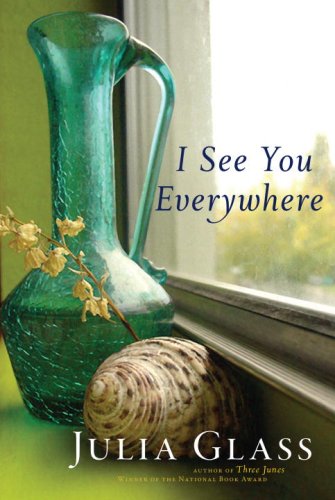
OK, so this one came from NPR's top books from 2008. I recognized the name Julia Glass from maybe a book of short stories that I read a few years ago for a writing class. I thought the book was very powerful because of it's subject matter- sisters, cancer, suicide, relationships, family, divorce, and on and on.
Based on the synopsis that was given on the back of the book, I was really hoping I'd like the book and give it to my sister to read. But the book isn't about something so simple as sisters who are polar opposites. The book also calls one sister the "responsible one" and one the "impetuous one." I did not find this the case at all! They took turns being responsible and impetuous, but all of this really depends on what the definition of responsible is because both girls are responsible in different ways.
The sisters took turns being the narrator of each chapter. I thought that the two girls were actually pretty shallow characters and even rather obvious and stereotypical opposites. For me, the only reason this book saved itself from the trash pile for me is because of the chapter about suicide and how the remaining sister and her family handled it.
7/28/09
The Reader

I've just been letting chance decide my books lately. So I found this book sitting a on a shelf and got to reading. I read the entire book in one sitting in the bath tub.
After the last book I read about cannibalism (The Taste of a Man), a story about a 15-year-old boy and his romance with a woman over twice his age wasn't as shocking. So I'm only need to gloss over that issue.
I liked Part 1. It told the story of their romance, silly things that the couple quibbled over, and how their relationship helped to teach Michael to become a man. His maturity and the ways that she touched him (other than physically, I mean) show up later in life and throughout the novel. Though Michael is much younger than his mistress, it's not particularly shocking or vulgar. Though, as I would in real-life, I do wonder why in the world a thirty-something woman would even consider becoming involved with a 15 year old, but hey, it's like 1950 or 60 in the novel.
Part 2 and 3, I didn't care for. I don't want to give away the ending of the book since it is still a new-ish movie, but when it is revealed that Hanna was a guard in a women's concentration camp during WWII and has to stand before a judge for war-crimes, the story begins to stretch itself too thin. When she is sent to prison and Michael begins to record readings for her, the story loses it's attraction because it is trying to hard. And when Michael reunites with Hanna only to find out that she is an old woman, it is just too obvious.
If you can't tell, I didn't like how the book ended.
The Taste of a Man
I almost had to put this book down and stop reading it. The back-side of the book reveals that the novel is about cannibalism, but I didn't read that until I had read the first few chapters. The novel hooked me though. I liked the story, I liked the way it was told, I could empathize with Tereza the narrator. Maybe that is why I took the end of the book so hard.
Tereza who is a graduate student in New York, meets Jose who is in the city on a grant while he is writing a book about the Uruguayan soccer team that crashed in the Andes and resorted to cannabilism to survive. However, Jose is already married, has a son, and another on the way. The couple ignore these facts until they are forced to face reality, and then Tereza jumps into action. She decides that the only way to keep Jose with her forever is to kill him and eat his flesh in order to unit them forever.
Even though I knew after the first chapter that this was the decision that Tereza would come to, toward the end of the book when his murder is described in detail and Tereza explains why she decided to eat his fingertips first, I was too involved and had to put the book down for a few days. It was a little overwhelming. The book was beautifully written.
"Strangely, though, the author seems most shocking when Tereza, her task finished, obeys the mundane dictates of the fashion magazines she's idly thumbing through: 'After a hard day's work, treat yourself to a luxurious bubble bath.' " NY Times
7/20/09
When You Are Engulfed in Flames

The first Sedaris book that I read was his novel Me Talk Pretty One Day. A friend gave it to me for my birthday along with Ariel by Sylvia Plath. Ariel pleased me mentally and psychologically, but Sedaris was my comic relief. I like his books for what they are: silly, humorous, dysfunctional stories of a silly, humorous, dysfunctional little man.
In the case of this book, Sedaris includes three things I find funny and entertaining: jokes about France, jokes about smokers, jokes about gays. He has a witty way of telling his side of the crazy situations he gets himself mixed up in. He is unapologetic and never embarrassed.
The title of the book comes from bad Engrish that he saw while he was in Japan trying to quit smoking. As an extra bonus he has a really cool Van Gogh painting on his front cover!
"I wear shorts only in Normandy, which is basically West Virginia without the possums."
7/7/09
Revolutionary Road

We went and saw Revolutionary Road in the movie theatre shortly after it's release and before the Academy Awards. I can't say I particularly loved the movie, but I did enjoy the look of the movie which was set in 1955 suburbia and the story. I didn't really buy into the Winslet-DiCaprio marriage, but John, a friend's psychotic son, saves the movie by being all-around crazy and intense.
So after reading A Good School, I decided to get another of Yates' books Revolutionary Road. As usual, the transfer from page to screen left a lot out. The book is a much more in-depth look into the lives of suburban couples, and not just the April-Frank relationship but also the relationships of the people around them.
It is a depressing book. Everyone is unhappy and dissatisfied with their lives. Though Frank and April are not happy together at the beginning of the novel, Frank acts out like a child and is selfish and stubborn. He snaps at his children, slacks off at work, berates his wife, and sleeps with a young, impressionable woman from work. On his 30th birthday, after coming home late from work because he was schtupping the girl from work again, April surprises him, acknowledges that she has been unbearable to him lately, and tells him about her plan to sell everything in America and move the family to Paris where she would support them financially while Frank figured out what he really wanted to do with his life.
Many of the other couples around them think they are crazy for planning to leave their normal, every-day, American life behind- except John, the crazy guy. Then, April finds out that she's pregnant. This new situation that the couple finds themselves in open up a lot of baggage for the couple because the option of abortion has come up numerous times in the past.
The Moon is Down
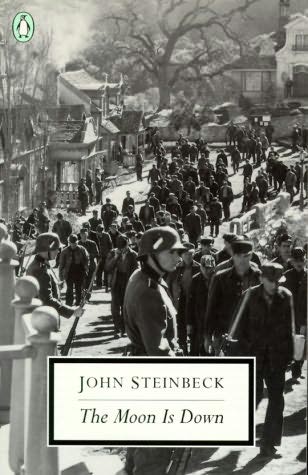
I am a big Steinbeck fan. I've loved him since I read Grapes of Wrath in high school. It wasn't until recently that I had the time to rediscover him though. My long trip started with East of Eden earlier this year and by the numbers I'm sure this will be a Steinbeck year for me.
The moon is down was Steinbeck's try at war propaganda. The US was in WWII and Steinbeck's way of supporting the war effort was writing this book. At the age of 40, the military probably didn't have much use for him so instead he worked with 2 organizations that preceeded the CIA. To gather information for this novel, Steinbeck interviewed refugees from countries that were occupied by Nazi Germany during the war. The novel was originally set in America, but before being published Steinbeck changed the setting to an unnamed country in Europe. This ended up being a good choice because when the novel was reprinted and reprinted in every possible language and handed out in occupied and soon-to-be-occupied nations.
The history surrounding this novel is as interesting as the novel itself. The book is very simple. It is about a country invading another and occupying a coal-mining town in order to receive free labor and free coal. The unnamed town is a democracy and so they prevail through hard-times (this is a piece of propaganda and the obvious message is democracy=GOOD).
Other writers and critics bashed the novel for it's obviousness and for humanizing Nazi's. The book however was noticed for being very realistic especially for being written by a man who lived across the ocean from Nazi occupation. The novel was edited for the stage and the screen.
Sons and Lovers
7/2/09
Tortilla Flat

I definitely am partial to Steinbeck novels, so each is truly my new favorite. Tortilla Flat is compared a lot to a Californian King Author and his knights and even has books dedicated to pointing out these similarities... which I have to admit are striking.
The book is based a on a maybe fictitious (by different accounts?) town where the Paisano's live near Monterey. The Paisano's are a mix breed of the Spanish, Indian, Mexican, anything... and according to the book apparently make their living doing nothing but drinking wine and discussing life and ethics while using their Tortilla Flat as a backdrop and setting. Steinbeck gives a description of a paisano, who speaks English with a paisano accent, and Spanish with a paisano accent, "He is a mixture of Spanish, Indian, Mexican and assorted Caucasian bloods. His ancestors have lived in California for a hundred years or two.... He lives in that uphill district above the town of Monterey called Tortilla Flat, though it isn't flat at all."
6/17/09
A Prayer for Owen Meany

It's been a long time coming to finish Owen Meany. It is a political novel, it is a religious novel, it is a coming-of-age novel. It is about searching for identity, love (both romantic and familial), war, on and on and on.
"WE HAVE A GENERATION OF PEOPLE WHO ARE ANGRY TO LOOK FORWARD TO," Owen said. "AND MAYBE TWO GENERATIONS OF PEOPLE WHO DON'T GIVE A SHIT," he added.
Owen Meany, though he annoyingly shrieks in capitals through the entire novel because of his freakishly high-pitched voice, is equal parts nut and sage, prophet and detective, rebellious and loyal. He's almost too perfect, but he is balanced out by our narrator Johnny Wheelwright.
The book begins as John reminisces about his childhood and his best friend Owen, it continues with huge events that define a lifetime. Own accidentally kills John's mother with a foul ball, Owen at the age of 8 takes the place of the baby Jesus in swaddling clothes, grandma gets a TV, Owen predicts his own death, the Vietnam War begins, etc, etc.
About half-way through the novel, it becomes more obvious that this novel is a flashback. The author begins telling two stories at once, the story of Johnny's childhood and the story of his current adulthood, simultaneously until event begin to overlap and everything falls into place for the reader. Admittedly, I began getting bored of the book during this middle part. I think the the book definitely benefits from this style of writing, because a completely chronological story would be boring and flat. It helps to build and create and shape the characters and helps lend realism and credibility to the fantastic nature of Owen Meany. The end though picked up pace and finished strong.
I can't speak to the religious nature of this book because it bored me. There was a lot of talk about the differences between Catholics and Episcopalians and I am sure a ton of references and metaphors in things that happened in the book, for instance Owen defaces a statue of Mary Magdalene by removing her from her pedestal. There are also decidedly obvious references to Hawthorne's Scarlet Letter.
Since I was not reading this novel for a class, I didn't take notes in it and on it as I usually would, but this book is definitely ripe to be picked apart. I'm sure I'll look up more information on the novel later, but as of today I've only looked at a writer's biography. I've also heard that there was a movie based on this book called Simon Birch, but the premis sounds a lot better. I also read on Wikipedia that John Irving let them write a screen play based on the novel but would not let them use the same names from his novel. Also the Simon Birch character who is based on Owen Meany is a dwarf while the cause of Owen Meany's short-stature and voice is never discovered in the novel.
6/14/09
Pygmy
 I am sad that this is my first post....
I am sad that this is my first post....I imagine the author is going to get a lot of flak for this book. I found the idea for the book obvious and the ending anti-climatic. I like to take "breaks" with books like these from my usual reading. Palahniuk couldn't really be listed as one of my favorite authors or anything, but he is a regular. I have read all of his books- the serve like my version of the romance novel, I'll read it once and then it goes to live the rest of it's life on some shelf at Half-Price Books.
Typically Palahniuk's books are an easy read, accessible, flow quickly.... and they have a level of vulgarity, depravity, etc (think Fight Club). There is usually something memorable about his books, even if it is just the urban legend he creates on the pages. But this book doesn't have it.
Come to think of it, last summer I was in this exact same position with Palahniuk and Snuff. He is failing to live up to his own name. He is relying too heavily on the vulgarity factor- a rape scene between the main character and a bully within the first 50 pages, references to "Pygmy's" turgid member, and constant jabber about impregnating 15 year old girls.
And I haven't even mentioned the voice of the narrator "Pygmy" that Palahniuk chooses to use in this novel. Palahniuk's character is a native of an unknown nation who has come to America. For whatever reason this character cannot speak English and doesn't seem to follow any language conventions. Even a non-native speaker wouldn't do this poorly and even after being in the USA for a few months, his language never improves as might be expected. The language is vague and confusing. I know the purpose of using this style, but when it takes a toll on the clarity and quality of a novel, this device should be abandoned fast.
The only thing this books did for me was forever link the word turgid and penis.
Greetings

Created with every intention to keep track of the great 2009 reading list. Like most college student (I hope...) I read so many books throughout the year, I can't even dream of keeping track. So, the experiment begins....
So far this year- completed since Jan 1, some were started in 2008 so I'm cheating a little.
Subscribe to:
Posts (Atom)
